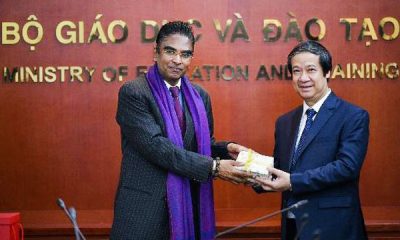Business
Vietnamese Foreign Minister highlights potential for Vietnam-SL economic cooperation
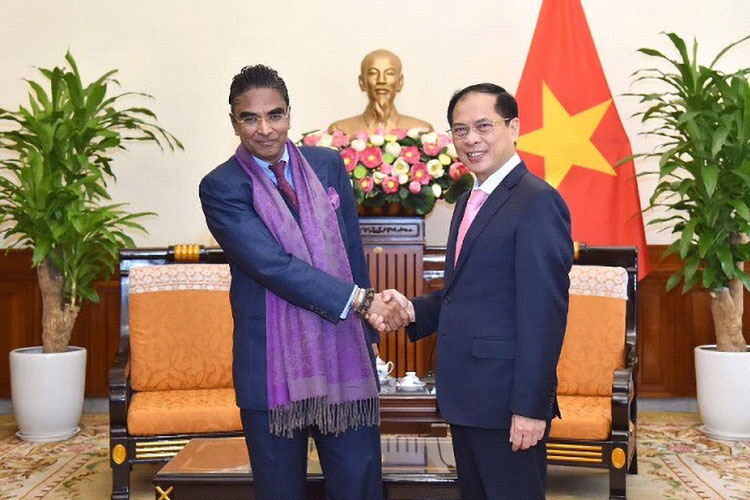
Vietnamese Foreign Minister, Bui Thanh Son, had a bilateral meeting lasting nearly 60-minutes with Ambassador for Sri Lanka in Ha Noi, Prof A. Saj U. Mendis, at the ministry head office. The primary objectives of the meeting with the Foreign Minister were to discuss and explore possibilities and avenues to enhance and aggrandize economic, commercial, investment, touristic and trade dimensions and other concomitants of foreign policy issues, particularly, in the context of multilateral cooperation and Sri Lanka’s entry into the largest trading bloc, known as the Regional Comprehensive Economic Partnership (RCEP), among others matters.
A press release issued by Sri Lankan embassy in Vietnam said: ‘Ambassador Mendis expressed appreciation to the Government of Viet Nam and to Minister Bui Thanh Son for the assistance and cooperation extended to Sri Lanka including its support at the Human Rights Council in Geneva. Minister further stated that the bilateral relations in the context of political relations have reached basically the maximal plateau between the two countries and it is of the intrinsic interest of both the countries to translate and transform the political utility to economic utility.
‘Ambassador Mendis stated that, today, Vietnam is among the fastest growing economies in the world and attracts and woos the largest percentage of FDI in comparison to the GDP. This is stated in the context that Vietnam attracted USD 22 billion in 2022 and this year, Vietnam anticipates FDI in the vicinity of USD 28-30 billion. In other words, this figure is over 6% of the GDP of Vietnam, which is the highest percentage of FDI vis-à-vis the GDP of any country. Ambassador Mendis stated that many international economists and analysts have coined terms such as “Miracle on Mekong region”, “Mecca for FDI and manufacturing” and “China plus One” referring to the rise and profile of Vietnam.
‘The Foreign Minister explained that Vietnam had to overcome three issues in order to advance its current status; firstly, infrastructure, secondly, developing soft infrastructure, such as human capital and digital transformation, and thirdly, formulation of foreign policy with reforms in the country that support integration with other countries. Vietnam wishes to exploit and leverage the potential of Sri Lanka in a myriad of sectors and realms. Since the trade between the two countries is at a modest level of around USD 350 million, both countries should have a lucid and focused objective to advance it to USD 500 million within the next year, and then reach USD 1 billion, in the foreseeable future.
‘The minister accentuated the vitality of tourism, since Vietnam is highly focused and is one of the most sought-after touristic destinations in the world, attracting over 10 million tourists in a given year. In this scenario, minister suggested that Sri Lanka and Vietnam could have bilateral tourism since very few Vietnamese travel to Sri Lanka despite the amazing and “riveting” natural beauty and fauna and flora, among others. In the context of air connectivity, the minister stated that direct flights maybe difficult to operate but they could operate charter flights since both the countries have a large Buddhist population. He also added that in 2022, approximately 10 million Vietnamese traveled out of the country, mostly to ASEAN, China, Japan and Europe and very few have traveled to Sri Lanka. Ambassador added that if Sri Lanka could capture 0.2%, it would translate to 20,000, which the minister too agreed needed to be aimed at.
‘The ambassador discussed that the augmentation of Vietnam within a space of two decades was primarily due to its 17 FTAs and Comprehensive/Strategic Partnership Agreements. In this context, Ambassador Mendis too echoed and resonated the sentiments expressed by Sri Lankan Foreign Minister in Jakarta of the deep interest that Sri Lanka has in joining the 15-member RCEP. The minister stated that Vietnam would fully and unreservedly support the application of Sri Lanka to join the RCEP. Amb. Mendis also enunciated the interest of Sri Lanka to have an FTA with Vietnam as both the countries could benefit with regard to bilateral trade.
‘Ambassador Mendis did underscore that both Sri Lanka and Vietnam had exports amounting to around USD 750 million in early 1980s, whereas, today the exports of Vietnam are in the vicinity of USD 370 billion and Sri Lanka is still hovering around USD 12-13 billion. The minister was visibly and discernably keen in enhancing and augmenting bilateral trade as well as bilateral investments between the two countries. Both the minister and ambassador, along with the respective delegations, agreed to exert the efforts and labour in a concerted, determined and proactive manner, thus elevating and deepening, mostly, economic and commercial activity between the two countries.’
Business
CBSL raises Rs. 120 billion at the T-Bill auction

Average yield rates decline across the board for third consecutive week
Market participants in the secondary market exhibited mixed sentiment, pivoting from the dull sentiment on Tuesday, observing thin trading volumes and limited market activity, according to First Capital Research.
The secondary market yield curve edged down slightly by 5bps across 3M, 6M and 1Yr maturities, following the weekly T-Bill auction results. The Central Bank of Sri Lanka (CBSL) conducted its weekly T-Bill auction on Tuesday, successfully raising LKR 120.0 Bn, with the total offered amount being fully accepted across all maturities, the research organisation said.
The 1Yr bill attracted the most interest, while weighted average yield rates declined across the board for the third consecutive week. The 03M bill closed at 8.62% (04bps), the 06M bill at 8.77% (-04bps), and the 1Yr bill at 8.96% (-06bps).
Amongst the traded maturities, 15.09.27 traded at a range of 9.85% to 9.80% whilst 15.02.28 and 15.03.28 traded in the range of 10.15% to 10.10% and both the maturities 01.05.28 and 01.07.28 traded between 10.05% to 10.03%.
Meanwhile, on the external front, the LKR depreciated against the USD, closing at LKR 295.61/USD compared to LKR 293.17/USD recorded the previous day.
Similarly, the LKR depreciated against other major currencies such as the GBP, EUR, AUD, CNY, and JPY.
CBSL holdings of government securities remained unchanged, closing at LKR 2,515.62Bn on Tuesday.
Overnight liquidity in the banking system contracted to LKR 159.37Bn from LKR 197.51Bn recorded the previous day.
On Tuesday, the stock market experienced a day of volatility, driven by mixed sentiment among investors. The index opened in negative territory but recovered after the first hour of trading, supported by increased activity in the Banking sector and prominent blue-chip stocks, First Capital Research said.
Business
HNB recognised for 15 years of excellence in corporate sustainability at BCCSA 2024
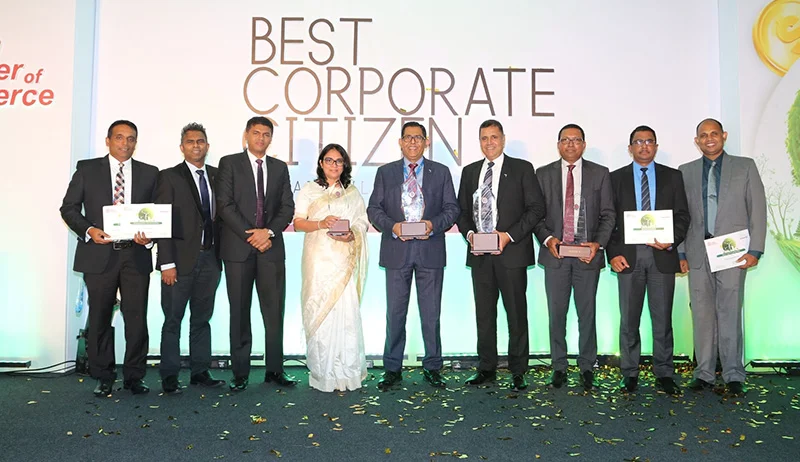
HNB PLC, was once again ranked among Sri Lanka’s Top 10 Best Corporate Citizens at the Ceylon Chamber of Commerce (CCC) Best Corporate Citizen Sustainability Awards (BCCSA) 2024.
Notably, this marks the 15th consecutive year HNB has earned this sought-after distinction, underscoring its enduring leadership in sustainability, corporate responsibility, and governance.
In addition to being placed among the Top 10 Best Corporate Citizens, HNB received three more prestigious accolades at the BCCSA 2024 awards, including recognition under the Triple Bottom Line Profit category, the Category Award for Economic Contribution, and the Best Project Sustainability award.
Commenting on the significance of the Bank’s outstanding performance at this year’s awards, HNB Managing Director/CEO, Damith Pallewatte said: “Our nation has reached a critical juncture. Moving forward, it is imperative that public and private sectors shoulder greater responsibility in the broader national effort to drive inclusive, sustainable development. This award serves as another important validation of HNB’s own efforts to lead this change, and we remain committed to serving as a steadfast partner in progress to all Sri Lankans.”
HNB’s success at BCCSA was attributed to its strategic focus on delivering efficient, ethical, and sustainable banking solutions to all segments of Sri Lankan society. Driven by an unwavering focus on securing equitable local and global partnerships that uplift both the rural and national economy.
Most recently, HNB has championed initiatives in green financing and sustainability, technological innovation, and community development, including facilitation of investments into critical infrastructure, and healthcare.
This includes pioneering initiatives like HNB Sarusara, which aim to transform Sri Lanka’s agricultural sector, boost national food security, and improve livelihoods for farmers across Sri Lanka.
Through the Sarusara Programme, HNB is committed to revitalizing Sri Lanka’s agriculture sector, uplifting rural economies, and enhancing national food security. Since launching in 2024, the programme as already engaged approximately 30,000 agripreneurs across the country by modernizing their agricultural practices and improving business outcomes. It promotes the adoption of cutting-edge agricultural techniques and technologies to enhance efficiency and yields, while supporting market access and export opportunities.
With Sarusara, HNB offers tailored financial products and services specifically designed to meet the needs of agripreneurs, thereby facilitating easier access to funding for agricultural ventures. Additionally, training and skill development are integral components of the program, equipping agripreneurs with the knowledge required to thrive in a competitive market.
Together with an exemplary record on transparency, accountability, and governance, HNB continues to set new benchmarks in banking and corporate excellence.
Business
Healthwashing, farmwashing, greenwashing and even sanewashing

by Sanath Nanayakkare
The UK government has woken up to the practice of healthwashing that some companies indulge in marketing their products by adding certain attributes in the marketing spin, according to an article in the Cambridge dictionary blog.
“Healthwashing is a practice where products such as food and vitamins are labelled in a way that suggests they are healthier than they actually are. By doing this, they increase the price of the product by a significant percentage and prey on the consumers by taking advantage of their health concerns,” it notes.
Delving deeper into the less than honest practice of using the suffix- washing- in marketing spin, the blog points out that Farmwashing is another practice where a company gives the impression that its products come from small, local, family-run farms, when this is not actually the case. Organic veg box company Riverford has teamed up with a group of British farmers to launch a new fairness campaign called “Farmers Against Farmwashing” aimed at exposing misleading supermarket “farmwashing” practices – where major supermarkets use fake farm brands and the overuse of the Union Jack to give shoppers the impression that their products come from quaint British family farms. However, much of the food is increasingly sourced from industrial mega farms or from overseas,”
“Meanwhile, Sanewashing is a practice where journalists or public figures portray someone with extreme ideas or policies as more reasonable and moderate than they actually are, in order to make the person more acceptable to a bigger number of people, The Poynter Institute, a journalism nonprofit, defines “sanewashing” as “the act of packaging radical and outrageous statements in a way that makes them seem normal.” “Sanewashing” is unusual in that it began not with politicians but with journalists, the Columbia Journalism Review suggests, or with people who pride themselves on not using clichés,” it notes.
Last but not least, greenwashing in marketing and advertising involves taking an existing product or service and spinning its environmentally friendly virtues even if there are none. It is hoped that Sri Lankan policymakers will also be alert and aware and watch such trends with the keenest of eyes.
-
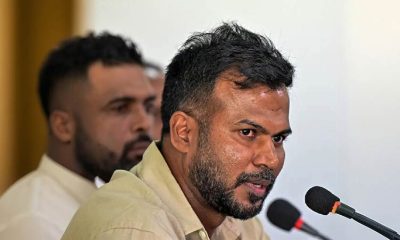
 Sports7 days ago
Sports7 days agoSri Lanka to mend fences with veterans
-

 Sports5 days ago
Sports5 days agoPathirana set to sling his way into Kiwi hearts
-
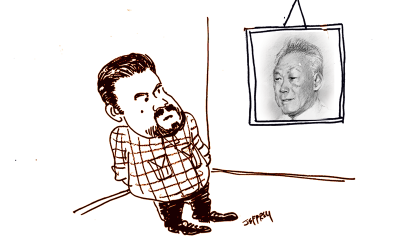
 Opinion7 days ago
Opinion7 days agoIs AKD following LKY?
-
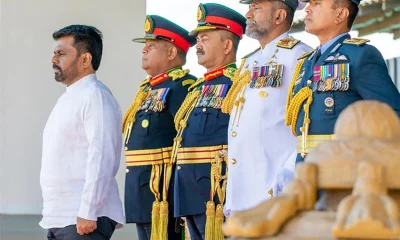
 News3 days ago
News3 days agoOffice of CDS likely to be scrapped; top defence changes on the cards
-
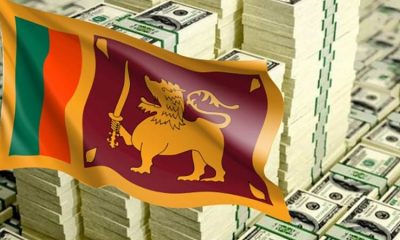
 News6 days ago
News6 days agoSL issues USD 10.4 bn macro-linked bonds
-

 Opinion7 days ago
Opinion7 days ago‘A degree is not a title’ – a response
-

 Editorial6 days ago
Editorial6 days agoRanil’s advice
-

 Editorial7 days ago
Editorial7 days agoLest watchdogs should become lapdogs


